A major work-life shift is reshaping India in 2025: thousands of professionals from Bengaluru, Mumbai, Delhi and Hyderabad are moving to smaller cities to enjoy a better lifestyle. This small-town remote work shift is driven by rising metro expenses, flexible jobs, improved internet access and a desire for calmer living. Tier-2 and tier-3 cities are now becoming mini tech hubs filled with remote workers, freelancers and digital creators.

Why Metro Professionals Are Leaving Big Cities
Metro life has become increasingly expensive and stressful. Many workers feel the lifestyle no longer justifies the cost.
Key push factors
• High rent
• Long commutes
• Traffic stress
• Expensive food and utilities
• Limited work-life balance
Remote work offers freedom — and many are using it to escape the chaos.
Why Small Cities Have Become More Attractive
Tier-2 cities now offer comfort without compromising on convenience.
Reasons people are shifting
• Affordable housing
• Eco-friendly surroundings
• Less pollution
• Better quality of life
• Access to cafes, coworking spaces and gyms
• Strong community vibes
Cities like Jaipur, Chandigarh, Indore, Coimbatore and Surat are the new favourites.
Internet & Infrastructure Have Improved in Tier-2 Towns
The biggest challenge earlier was unreliable internet. That’s no longer the case.
Improvements seen
• High-speed fiber networks
• Stable 4G/5G connectivity
• More coworking spaces
• Growing delivery services
• Banking and government services online
This makes remote work seamless.
Remote Jobs Are Growing Across Sectors
Companies across India are now hiring remote talent for long-term roles.
Popular remote-friendly fields
• Digital marketing
• Coding and software
• Graphic design
• Customer support
• Data analysis
• Content writing
• AI and tech operations
Professionals can earn metro salaries without metro expenses.
Massive Cost Savings for Families & Singles
Moving to a smaller city cuts living expenses by 40–60%.
Typical savings
• Rent becomes 3–5x cheaper
• Food costs reduce
• Transport expenses drop
• Entertainment becomes affordable
• Less lifestyle pressure
This extra money helps people invest, save and travel more.
Better Work-Life Balance and Mental Peace
Small-town living naturally encourages healthier habits.
Advantages people experience
• More family time
• Cleaner air
• Access to outdoor activities
• Slower, calmer lifestyle
• Lower stress levels
The mental health benefits are significant.
Local Economies Are Growing Because of Remote Workers
As more young professionals move in, local businesses benefit.
Boost to local sectors
• Cafe culture
• Fitness centers
• PGs and rental homes
• Grocery businesses
• Delivery apps
• Weekend tourism
Small cities are becoming more modern and vibrant.
Challenges Remote Workers Still Face
The shift isn’t perfect — some issues remain.
Common challenges
• Limited nightlife
• Fewer speciality restaurants
• Smaller friend circles
• Occasional service delays
• Fewer high-end medical facilities
Still, most find the trade-off worth it.
Future of Remote Work in India’s Small Cities
Remote work is here to stay, and small towns will continue growing as work-friendly destinations. Many startups are opening satellite offices in tier-2 regions because talent is moving there voluntarily.
The small-town remote work shift is not a temporary trend — it’s a long-term lifestyle change embraced by thousands.
Final Thoughts: A Lifestyle Reset Many Indians Needed
For Indian professionals tired of metro pressure, moving to a smaller city brings peace, savings and balance. With stable internet, growing coworking spaces and supportive employers, the small-city life is becoming a smart career choice.
FAQs
Which are the best small cities for remote workers?
Jaipur, Chandigarh, Indore, Coimbatore, Surat and Mysuru are popular.
Do remote workers earn the same as metro employees?
Yes, many companies offer location-independent salaries.
Is internet stable in tier-2 cities?
Most cities now have reliable fiber and 4G/5G networks.
Are coworking spaces available in small towns?
Yes, the number has grown rapidly in the past two years.
Is shifting to a small city worth it?
For most people seeking balance and savings, yes.
